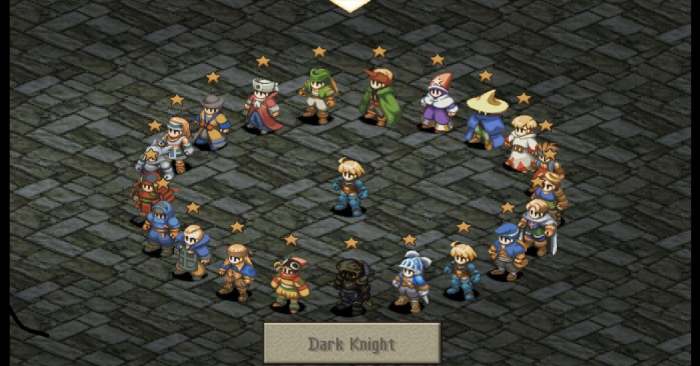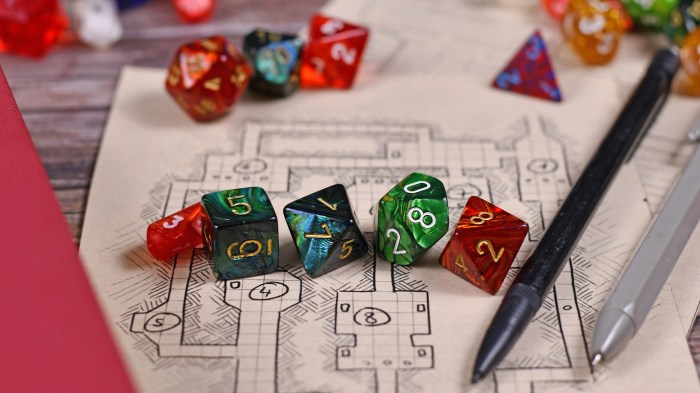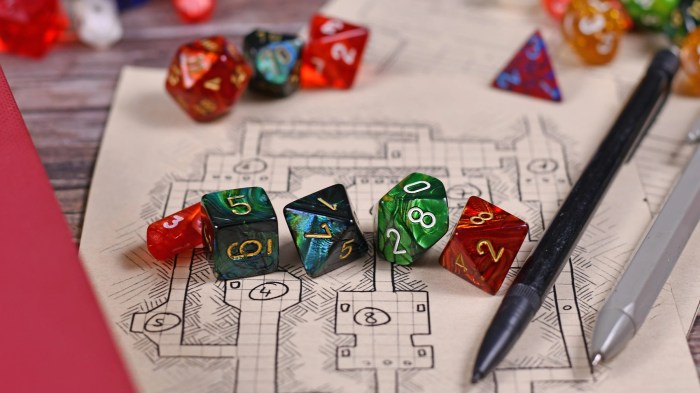RPG (Role-Playing Game) – it’s more than just clicking buttons; it’s about crafting a character, forging alliances, and battling epic monsters. From humble tabletop beginnings to sprawling online worlds, RPGs have captivated gamers for decades, offering unparalleled freedom and immersive storytelling. This exploration dives into the rich history, diverse mechanics, and lasting cultural impact of this beloved genre.
We’ll trace the evolution of RPGs, from their analog roots to the complex, visually stunning games of today. We’ll examine the core mechanics that make them tick – character creation, combat systems, and narrative choices – and explore the diverse subgenres that cater to every gaming style, from the tactical depth of CRPGs to the vibrant worlds of JRPGs.
Get ready to level up your understanding of RPGs!
History of RPGs: RPG (Role-Playing Game)

The evolution of role-playing games (RPGs) is a fascinating journey, spanning from humble tabletop beginnings to the sprawling, immersive worlds of modern video games. This journey reflects not only technological advancements but also a shifting understanding of what constitutes engaging and compelling storytelling within interactive entertainment. We’ll explore this evolution, highlighting key moments and examining the changes in mechanics and narrative styles.
Evolution from Tabletop to Video Games
The origins of RPGs lie firmly in tabletop games. Games like Dungeons & Dragons (D&D), published in 1974, established the core tenets of the genre: character creation, dice-rolling mechanics, collaborative storytelling, and a focus on exploration and adventure. These games relied heavily on imagination and the Dungeon Master’s ability to create immersive scenarios. The transition to video games wasn’t immediate; early attempts to translate the experience were often clunky and limited by the technology of the time.
However, as computing power increased, developers began to find ways to capture the essence of tabletop RPGs digitally.
A Timeline of Significant RPG Releases
Several key releases significantly shaped the RPG genre’s trajectory. Early examples likeWizardry* (1981) and
-
Ultima I
The First Age of Darkness* (1981) demonstrated the potential of computer RPGs, albeit with very simple graphics and mechanics.
- The Bard’s Tale* (1985) and
- Eye of the Beholder* (1991) further refined the first-person dungeon-crawling perspective, establishing a subgenre that remains popular today. The arrival of
- Baldur’s Gate* (1998), based on the D&D ruleset, marked a turning point, showcasing the power of isometric graphics and a sophisticated story. The
- Final Fantasy* series, starting with its first entry in 1987, continuously pushed the boundaries of storytelling and visuals, establishing itself as a major force in Japanese RPGs (JRPGs). More recently, titles like
- Disco Elysium* (2019) demonstrate the genre’s continued evolution, prioritizing narrative depth and player choice.
The Witcher 3
Wild Hunt* (2015) and
Comparison of Early and Modern RPGs
Early RPGs often prioritized mechanics over narrative, featuring relatively simple stories and often relying on cryptic descriptions and indirect storytelling. Combat systems were often turn-based and relied heavily on dice rolls or simple algorithms. Modern RPGs, in contrast, often prioritize rich, branching narratives, complex characters, and nuanced storytelling. While dice rolls and turn-based combat still exist, modern games frequently incorporate real-time combat, action RPG elements, and sophisticated AI, enhancing the player experience.
Early games had limited graphical capabilities, relying on text descriptions and simple sprites, while modern RPGs often boast stunning visuals and expansive game worlds. The difference between the two is stark, reflecting both technological advancements and a deeper understanding of game design principles.
Key Features and Innovations Across RPG Eras
| Era | Key Games | Notable Features | Impact |
|---|---|---|---|
| Golden Age (1980s-early 1990s) | Wizardry, Ultima, Bard’s Tale, Eye of the Beholder | Text-based interfaces, simple graphics, turn-based combat, dungeon crawling, character classes | Established core RPG mechanics and laid the groundwork for future iterations. |
| PC RPG Boom (mid-1990s-early 2000s) | Baldur’s Gate, Diablo, Fallout, Planescape: Torment | Improved graphics, isometric perspective, enhanced storytelling, party-based gameplay, more complex mechanics | Brought RPGs to a wider audience, emphasized narrative and character development. |
| Modern Era (2000s-present) | The Witcher 3: Wild Hunt, Dragon Age: Origins, Mass Effect, Disco Elysium | Open-world environments, advanced graphics, branching narratives, deep character customization, diverse gameplay styles | Continuous refinement of existing mechanics, pushing the boundaries of narrative depth and player agency. |
| MMORPG Era (Ongoing) | World of Warcraft, Final Fantasy XIV Online, Guild Wars 2 | Persistent online worlds, massive player interaction, social aspects, ongoing content updates | Created entirely new social and gaming experiences, extending the lifespan of RPGs. |
RPG Gameplay Mechanics

So, you’re diving into the world of RPGs, huh? Great! Understanding the mechanics is key to enjoying the experience, whether you’re a seasoned adventurer or a fresh-faced newbie. This section breaks down the core elements that make RPGs tick, from creating your character to battling monsters and progressing through the game.
The core of any RPG lies in its gameplay loop: character creation, exploration, combat, and progression. These elements intertwine to create a unique and engaging experience. Let’s examine each in detail.
Character Creation
Character creation is where your adventure begins. It’s the process of designing your avatar, defining their stats, skills, and often their backstory. Typical RPGs allow you to choose a class (like warrior, mage, rogue), race (human, elf, dwarf), and sometimes even customize their appearance. The choices you make here significantly impact your playstyle and your character’s strengths and weaknesses throughout the game.
Some systems allow for extensive customization, letting you meticulously craft a character to your precise specifications, while others offer more streamlined options. A well-designed character creation system allows for a sense of agency and ownership over your in-game persona.
Combat Systems, RPG (Role-Playing Game)
RPG combat systems vary wildly, each offering a distinct feel and challenge. The most common types include:
Different combat systems cater to different preferences. Turn-based systems prioritize strategic planning, while real-time and action RPG combat demands quick reflexes and precise timing. The best system depends entirely on personal preference and the overall design of the game.
- Turn-Based: Characters take turns performing actions, allowing for careful consideration of strategy and resource management. Examples include games like
-Final Fantasy* and
-Divinity: Original Sin*. - Real-Time with Pause: Combat unfolds in real-time, but players can pause the action to issue commands and plan their strategy. This combines the speed of real-time combat with the tactical depth of turn-based systems.
-Baldur’s Gate III* uses this system effectively. - Real-Time: Combat happens continuously, demanding quick reflexes and immediate decision-making. Action RPGs often employ this system, with games like
-Diablo* and
-Path of Exile* being prime examples. - Action RPG: These blur the lines between action games and RPGs, often featuring fast-paced, real-time combat with RPG elements like character progression and loot. Games like
-The Witcher 3* and
-Dark Souls* represent this style.
Character Progression Systems
As your character gains experience, they grow stronger. This is managed through various progression systems:
The choice of progression system greatly impacts the player experience. Leveling up provides a straightforward sense of accomplishment, while skill trees and talent systems offer more granular control and customization. Many games blend these systems for a well-rounded progression experience.
- Leveling Up: The classic system where characters gain experience points (XP) by defeating enemies and completing quests. Reaching a certain XP threshold unlocks a new level, granting stat increases and sometimes new abilities.
- Skill Trees: Players allocate points to improve specific skills, often visualized as a branching tree. This allows for specialization and customization of character builds.
- Talent Systems: Similar to skill trees, but often with more complex interactions between talents, creating synergistic effects and unique playstyles. These systems often feature choices that create trade-offs, requiring careful planning.
Simplified RPG Combat System
Let’s design a simplified turn-based combat system:
This system is designed to be easy to understand and implement, yet still offer strategic depth. It focuses on core mechanics without unnecessary complexity.
Core Mechanics:
- Characters have three stats: Attack, Defense, and Health.
- Combat is turn-based: Each character acts one at a time.
- Attack damage is calculated: (Attack – Defense) = Damage. If the result is negative, damage is 0.
- Characters can use abilities: Abilities have their own damage values and may have additional effects (e.g., healing, status effects).
Example: A character with Attack 10 and Defense 5 attacks an enemy with Defense 2. Damage = (10 – 2) = 8. The enemy takes 8 damage.
FAQ Overview
What’s the difference between an MMORPG and a CRPG?
MMORPGs (Massively Multiplayer Online Role-Playing Games) are played online with hundreds or thousands of other players simultaneously, while CRPGs (Computer Role-Playing Games) are typically single-player experiences.
Are RPGs only fantasy-themed?
Nope! While fantasy is a popular setting, RPGs explore sci-fi, historical, and even modern settings. The core elements—character progression, story choices, and combat—remain central regardless of the theme.
How do I choose my first RPG?
Consider your preferred play style. Do you prefer turn-based combat or real-time action? Do you want a sprawling online world or a more focused single-player experience? Check out reviews and gameplay videos to find a game that fits your taste!
What are some popular RPG franchises?
Think
-The Elder Scrolls*,
-Final Fantasy*,
-Fallout*,
-Mass Effect*,
-Diablo*, and
-Pokémon*—just to name a few!
